Earlier this month we welcomed a whole host of change makers to Magpie HQ as part of our ’24 Ideas for 2024′ creative retreat series. The goal for these interactive and uplifting sessions is to explore shared challenges and unlock new ideas to help us develop in our personal and professional lives – with each session addressing 6 challenges and unlocking 6 ideas. The energy in the room was electric, with some fascinating and insightful conversations taking place and new connections being made. Here are some of our key findings from the day:
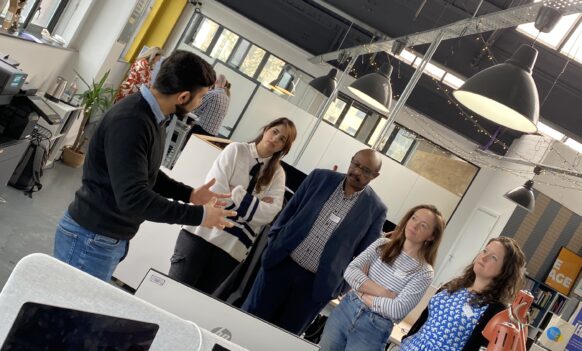
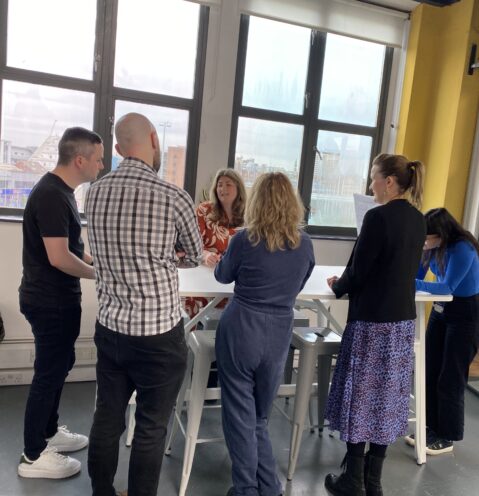
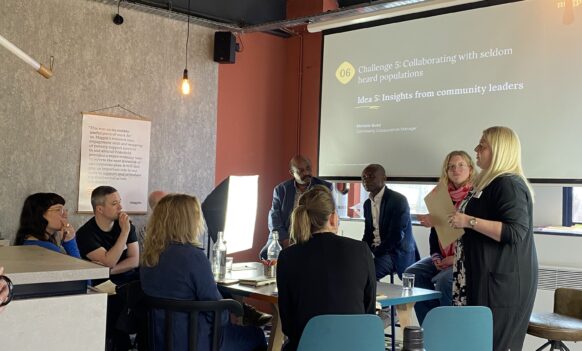
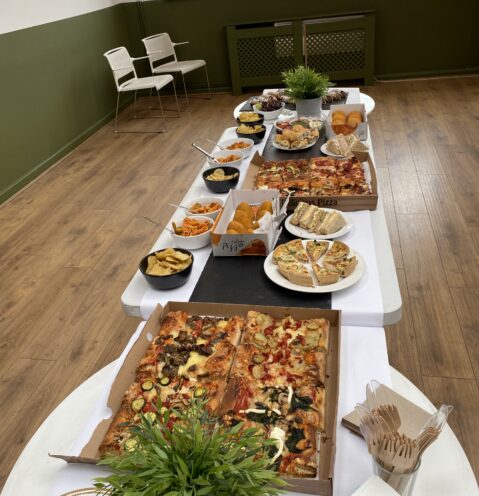
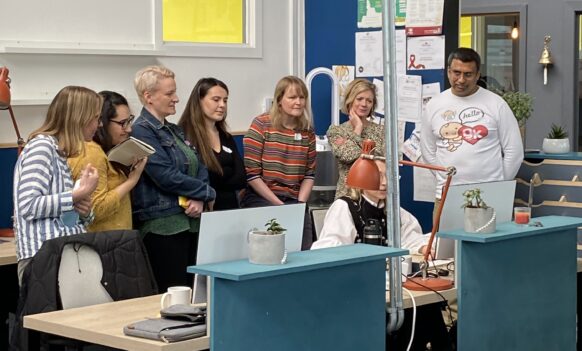
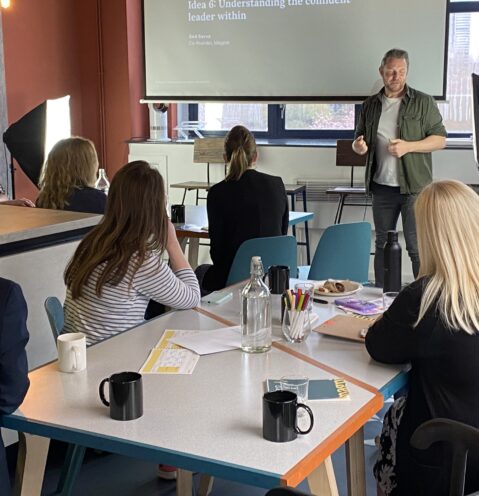
Challenge 1: Combating Professional Fatigue
Idea 1: Breaking the Hamster Wheel
Our first session involved an exploratory discussion around the universal experience of professional fatigue. The concept of ‘burnout’ has become increasingly prevalent in a post-lockdown world, with a recent study noting that at least 79% of UK employees experience burnout, and around 35% reporting extreme or high levels of burnout (Spill 2024). The economic and health ramifications of this alarming statistic are a key focus for many in the wellbeing industry, with much attention being focussed on addressing the root causes.
As part of our efforts to help attendees conquer their professional fatigue, we reflected on 2 key statements to generate ideas for tackling burnout if/when it arrives. These were:
Remember your roots – a useful grounding exercise in moments of internal doubt and exhaustion is to remind yourself the main reason you took on the challenge of your role in the first place. As change-makers focussed on supporting communities and delivering social impact, it can be helpful to reflect on what motivated you to get involved initially, and re-align your focus toward this.
Don’t forget to look up! – Often there are repetitive elements to professional roles that, although important, can feel like they are detracting attention from areas of higher impact. The reality is that we can become myopic and focus only on the day-to-day activities without stopping to take stock of all the progress we have made along the way, and crucially, celebrate the successes.
Attendees also shared other ways they personally combat professional fatigue, including;
- Protecting professional boundaries – particularly when working from home to ensure we take the time we need on an evening to recharge and resist logging on for a quick reply
- Taking small breaks throughout the day to avoid overload
- Putting lunch in the diary and taking time to refuel
- Changing up the day – refreshing your routine to keep things varied
- Drawing on support from colleagues – a brew and a chat can work wonders
Despite the challenges of manoeuvring the modern working world, it’s crucial we all take the time to reflect, rest and recharge. The communities we’re supporting are relying on it.
Challenge 2: Approaching and Understanding AI
Idea 2: Using AI as a Time and Energy Saver
The topic of AI has generated a huge amount of discourse online and in the media, with many users making grandiose claims about its application and outputs. There’s no doubt AI can have a transformative effect in saving time and energy, and the Magpie team were happy to provide a basic demonstration of some of the tools we have begun to explore:
ChatGPT
Text based AI tools like ChatGPT and ChatPDF can be immensely helpful in increasing efficiency by condensing large amounts of information in simplified and digestible portions, tailored to our requirement. To effectively utilise these tools, it’s crucial to set the role, requirements, and task details, including the target audience and purpose. Additionally, specifying the tone, nature of the output, and any boundary conditions is essential.
At Magpie, we use text-based AI for research purposes such as literature reviews, summarising, and quantitative analysis support, as well as some initial stage campaign development like idea generation. However, it’s important to acknowledge the limitations and constraints of text-based AI, including its reliance on the prompt provided, potential for generating inaccurate information, and limited knowledge base.
OtterAI
Other tools such as Otter AI can save a lot of time and energy through developing speech to text transcription applications using artificial intelligence and machine learning. Whether you’re taking notes in a meeting or recording responses from a panel event, OtterAI can do some of the ‘leg work’ and allow you time to be more present in the moment. Throughout this demonstration, we explored challenges such as prohibitive costs for some AI tools, and a need to know the country of origin of the AI tool is important as not all organisations permit software from every location. We also discussed the link between utilising AI and GDPR policy and general work-place policy adherence.
AI in Adobe
In a more creative sense, AI tools in Adobe can be applied to provide helpful edits to photography work such as re-sizing and re-formatting scale. It’s important to note that, whilst they may be helpful time and energy savers, these tools can never be a substitute for creative and design inspiration, but instead provide assistance in generating outputs more effectively.
We also explored the use of AI in enhancing audio quality for video content – Adobe Enhanced Speech is an online artificial intelligence software tool by Adobe that aims to significantly improve the quality of recorded speech that may be badly muffled, reverberated, tinny, etc. and convert it to a studio-grade, professional level, regardless of the initial input’s clarity.
With proper understanding and guidance, AI can be a valuable tool in various contexts. Find out more about getting started with this beginners guide from Magpie.
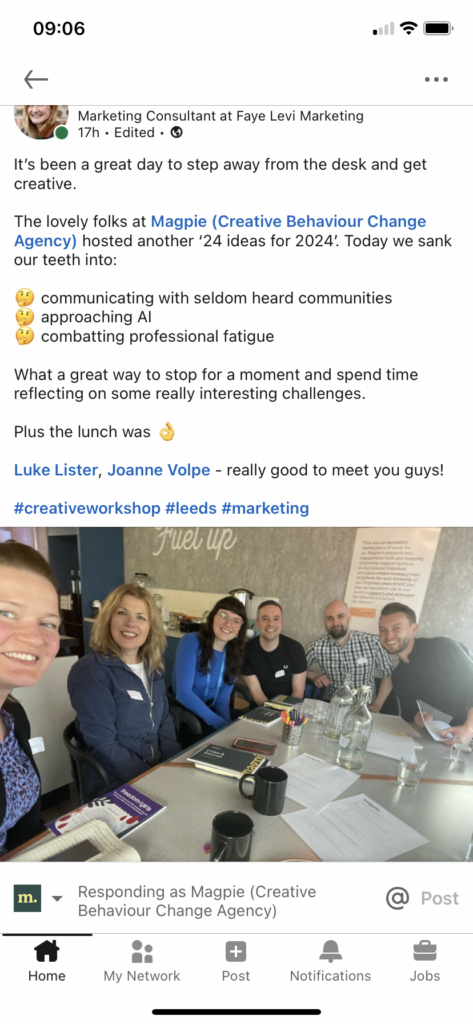
Challenge 3: Preventing Stress and Exhaustion
Idea 3: Conquering the Night Self
Come the evening hour, the darkness, wrote Virginia Woolf, “we are no longer quite ourselves”.
In our session on “Preventing Stress and Exhaustion: Conquering the Night-Self,” we looked at the intricacies of sleep hygiene and nurturing a healthier nocturnal relationship with ourselves to enhance overall well-being.
Modern society presents a complex dynamic with sleep. On one hand, there’s a stigma surrounding ample sleep, often viewed as indulgent or unproductive compared to activities like exercise or healthy eating. Conversely, the growing awareness of sleep’s vital role in health can intensify anxieties and pressure to achieve perfect sleep patterns. During the interactive session, we navigated both perspectives – recognizing sleep’s significance while embracing the night-self and discovering personalised strategies. It’s crucial to recognize the nuances of sleep and insomnia, discovering what works best for each person. Sleep scientists have found that at night we reach an altered state of mind which is reflective, creative and vulnerable, allowing for new insights. Therefore, sleepless nights need not always carry negative connotations. By relinquishing self-judgement and the pressure for flawless sleep, we can harness the potential of our nocturnal consciousness for heightened creativity, insight, and introspection. By reframing our understanding of sleep, we pave the way for a healthier, sustainable relationship with it. Sleep serves myriad purposes, including emotional regulation, stress hormone reduction, mental health maintenance, rejuvenation, and cognitive enhancement.
Sleep is foundational for our overall well-being, and behavioural science offers effective techniques to enhance both the duration and quality of our sleep. Two formal approaches are Cognitive Behavioural Therapy for Insomnia (CBT-I) and Behavioural Sleep Medicine (BSM). A structured approach rooted in CBT-I principles involves a three-step framework:
Cognitive Restructuring: This step involves identifying, challenging, and reshaping thoughts and beliefs that contribute to insomnia. By addressing negative thought patterns and replacing them with more constructive perspectives, you can alleviate sleep-related anxieties.
Stimulus Control: Creating an environment conducive to sleep is essential. This includes avoiding stimulating activities before bedtime and maintaining a bedroom that is simple and free from distractions. By associating the bedroom solely with sleep and relaxation, individuals can strengthen the connection between bedtime and restfulness.
Habit Formation: Establishing consistent sleep habits is key to improving sleep patterns. This involves setting and adhering to a regular sleep schedule, limiting time spent in bed to actual sleep, and practising good sleep hygiene rituals, such as engaging in calming activities before bedtime.
Creating a healthy relationship with sleep involves prioritising both the quantity and quality of rest necessary to reduce stress levels. However, it also requires reshaping our perception of our nocturnal selves. Rather than excessively pressuring ourselves to consistently attain perfect sleep, it’s crucial to appreciate the natural fluctuations in our nightly experiences and embrace the changes in our minds and bodies during the night. By doing so, we can foster a more balanced approach to sleep, prioritising self-care and personal growth and thus preventing stress and exhaustion.
Challenge 4: Influencing positive action through multi-sensory experiences
Idea 4: The psychology of music and wellbeing
Music Psychologist Dr Chrissie Harney discussed the power of music to improve the social, physical and emotional areas of our lives. The content for this session acted as an invitation for attendees to think about our music libraries in a way that works for us and the demands of our life through an engaging activity involving key models from the research area.
Activity
Select one strategy and think of a song from your music library that applies:
Entertainment – creates a pleasant environment, happy feelings
Revival – strong energy renewal
Strong sensation – intense experience such as musical chills
Diversion – forget unwanted thoughts
Release – release negative emotions
Mental work – music for contemplation
Solace – comfort, acceptance when feeling sad
You can download the slides and resources here.
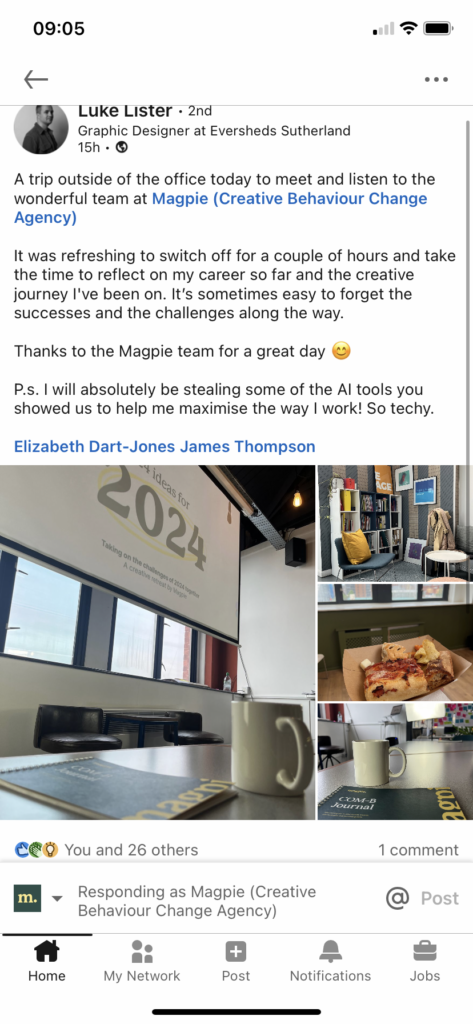
Challenge 5: Collaborating with seldom-heard populations
Idea 5: Insights from community leaders
At Magpie we understand that community engagement and collaboration is fundamental in delivering campaigns with proven social impact, and we’re equally mindful of the significant role community leaders play in garnering insight from seldom heard groups. During this session we invited a panel of community leaders to reflect on their experiences and share their insights around how we can be better allies and provide platforms to lift up community voices.
The panel was made up of expert representatives from The Bradford African Community, Freedom 4 Girls UK, and the Leeds Refugee Forum – led by Magpie Community Collaboration Manager, Michelle Budd.
We discussed increasing poverty levels in the UK alongside an increased demand for services (Freedom 4 Girls reported a demand for over 8000 period packs in Leeds in 2023, a figure which has more than doubled in the last 2 years). We explored some of the challenges faced by vulnerable people seeking support – from language barriers precluding access to many of the basic requirements for a stable lifestyle; to the limited resources and restricted funding of key support organisations – the charity, Bradford African Community, recorded over 3000 drop-in meetings at their visitor centre were in regards to a query about an official piece of correspondence they had received. This ongoing cycle of destitution has trapped many of the most marginalised people in impossible circumstances, and the impact of this is not only felt in communities but also rests heavily amongst those charged with providing access routes and opportunities. “We can’t just close our doors, this support is desperately needed.”
Some of the ways we discussed helping organisations provide better support for community leaders and connect with seldom heard communities include:
- Building trust – a lack of trust is a significant barrier in engaging with seldom heard groups, and this is frequently as a result of previous poor experiences that break down relationships between service providers and users
- Join existing networks of community groups and spend time amplifying their voices/message
- Volunteer your time in skills-sharing exercises to help uplift communities and empower individuals to take positive steps forward; equipped with the skills needed for success
- Take the time to listen – you’ll quickly realise that all marginalised communities are part of seldom heard groups, it’s intersectional
- Be a friend!
One of the most important things for us is finding ways to reach seldom heard voices which can be a challenge because you can often find barriers that come along with this mission, and as Community Collaboration Manager here at Magpie I feel it’s imperative that these voices are heard, it matters, and we as a collective need to continue to find ways to help uplift and amplify those voices.
Michelle
From our panel discussion and Q&A we hit upon some really interesting and important factors. Marginalisation, patriarchy, language barriers, health inequalities and poverty to name a few, all of which we take a bit more of deep dive into during the session.
It’s clear that trust is also an important element to reaching the people that need to be heard, you need to build on that – you cannot take it, intentions are not always seen immediately, whether they’re good or not, people who have been marginalised for whatever reason will need time to build their level of trust.
We are producing a mini-podcast and round-up of the panel discussion and can’t wait to share our key moments and takeaways with you.
Thank you to Ali, Asumnani & Sarah for their time, openness and honesty throughout, we really appreciate it and all learned a lot from their wisdom.
Community Collaboration Manager
Challenge 6: Finding confidence during times of change
Idea 6: Understanding the confident leader within
In this session Magpie’s cofounder, Ged, shared an exercise courtesy of Common Purpose, a global non-for-profit organisation he is part of. Common Purpose is all about leading beyond boundaries and delivering transformative learning experiences for individuals and organisations who want to make a difference in their worlds, and the world around them.
In this session, we looked at the areas and circumstances in our lives that require and/or test our confidence and reviewed our confidence levels in different situations in order to shape our confidence levels moving forwards.
You can access this exercise and create your own confidence diagram here.
Access the full session content here
If you’d like to register your interest in attending the next 24 Ideas for 2024 event (online or in-person) please email hello@wearemagpie.com
24 Ideas for 2024